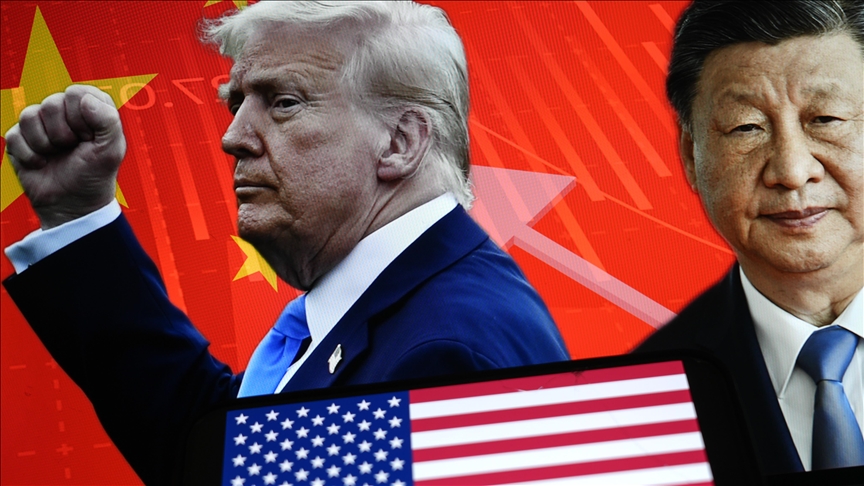- ‘The MAGA ethos is rooted in the belief that America has been ripped off, particularly by China with its cheap products,’ says Jussi Hanhimaki of the Geneva Graduate Institute
- The US market contributed significantly to China’s growth over the last four decades and is ‘irreplaceable’ for Beijing, says senior China expert Andrea Ghiselli
ATHENS
As Donald Trump marks 100 days of his second presidency, US rhetoric about China and its role in America’s industrial decline has resurfaced with renewed intensity, becoming a cornerstone of his political strategy, according to experts on US-China relations.
“The MAGA ethos is rooted in the belief that America has been ripped off, particularly by China with its cheap products. It’s seen as the main culprit in the loss of manufacturing jobs over the past three decades,” said Jussi Hanhimaki, a professor of international history and politics at the Geneva Graduate Institute.
Trump’s return to power has been marked by the unprecedented move of implementing sweeping reciprocal tariffs on dozens of countries around the globe, with China bearing the brunt.
These measures are intended, according to the Trump administration, to compel companies to return manufacturing operations to domestic shores.
Yet, according to Hanhimaki, Trump’s approach overlooks the complexity of the structural issues underpinning America’s economic challenges, particularly the transformations driven by globalization and technological advancement.
“It is important to understand that China’s rise from a minor player to the world’s second-largest economy has reshaped global dynamics, making the issue an American one, not only of Trump,” Hanhimaki emphasized.
He highlighted that the sentiment towards China as a competitor is bipartisan, stretching beyond Trump’s policies.
“Obama talked about pivoting to Asia, and Biden’s administration continued many of Trump’s policies on China,” he said.
“So, it is bipartisan. China is seen as the major competitor, economically and geopolitically.”
Despite the popular appeal of Trump’s aggressive stance, Hanhimaki argues that the president’s vision of rapidly revitalizing American manufacturing through tariffs is unrealistic.
“Trump’s narrative, albeit a reliable vote-getter, oversimplifies a structural challenge. The loss of manufacturing jobs didn’t happen overnight. The idea that you can reverse it in a four-year presidency, or with a single tariff, is unreasonable. America won’t suddenly become a manufacturing haven,” he said.
Furthermore, Hanhimaki warns that Trump’s unilateral tariff approach risks isolating the US from key allies who share concerns over China’s rising influence.
“Going it alone seems counterproductive. This doesn’t win points with partners who share America’s concerns about China,” he noted.
When asked if Trump’s tariffs might force Beijing to the negotiating table, as Trump hopes, Hanhimaki acknowledged the complexity of engaging with China, a nation economically reliant on global trade but fiercely protective of its state-driven economic model.
“It’s a trading economy, reliant on initiatives like the Belt and Road. But it’s a tough negotiator, and its state-driven model clashes with Western expectations of free markets,” he said, adding that back-channel negotiations between the two superpowers might already be underway despite the public hostility.
Ultimately, even if Trump achieves some of his objectives and encourages companies to return manufacturing to the US, Hanhimaki points out that technology will limit the job gains anticipated by many Americans.
“Even if factories return to the US, it won’t be the 1950s. Automation, AI, 3D printing – that’s the new reality. Jobs won’t come back the way people imagine,” he explained.
China’s strategic response
Andrea Ghiselli, a senior China expert and lecturer at the University of Exeter, highlighted how Trump’s tariffs caught Beijing off guard.
“China knew its immense trade surplus with the US, as with almost every other country, was going to be a central issue in the relations with the new American administration,” he told Anadolu.
“However, it is likely that it was not expecting a declaration of full-scale trade war through the unprecedented tariffs that Trump announced.”
Despite the initial shock, Ghiselli pointed out that China under President Xi Jinping has significantly improved its resilience and adaptability.
Beijing quickly implemented retaliatory measures, such as imposing tariffs of up to 125% on American goods and restricting rare earth exports, signaling its readiness for tit-for-tat escalation with Washington.
He emphasized that Chinese leadership views the trade war as a critical political and strategic challenge, and does not want to be the one to blink first.
“However, the US market, which contributed significantly to China’s growth over the last four decades, is irreplaceable,” he pointed out.
“In addition, the current challenges China faces, such as the property sector crisis and low consumer spending, would be exacerbated by a trade war with the US.”
Given these vulnerabilities, Ghiselli believes that China neither desires nor anticipates a prolonged trade conflict, recognizing it is unlikely to win such a war in the medium or long term.
He noted that a prolonged trade war would also severely impact the US economy due to its extensive integration with China since the early 1980s, especially in sectors affecting the cost of living.
“Bilateral dialogue between competent officials of the US and China has never been cut. Most likely, they are presently engaged in dialogue, even though the Chinese Foreign Ministry has repeatedly denied it,” Ghiselli stated, expressing his belief in the likelihood of a negotiated settlement.
However, should Trump insist rigidly on his demands and refuse compromise, Ghiselli warned that China could be forced to radically restructure its economic model, emphasizing domestic consumption over exports.
“Chinese policymakers have long talked about this but the social and economic costs have probably prevented them from pushing change through,” he explained.
“Blaming the US might provide some political cover for this. In any case, we are likely to witness a hardening in the Chinese position as Beijing prepares for a long economic struggle with Washington,” he concluded.

